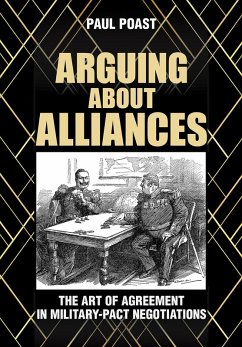
The Origins of Alliances (eBook, ePUB)
Versandkostenfrei!
Sofort per Download lieferbar
19,95 €
inkl. MwSt.
Weitere Ausgaben:

PAYBACK Punkte
10 °P sammeln!
"The Origins of Alliances offers a different way of thinking about our security and thus about our diplomacy. It ought to be read by anyone with a serious interest in understanding why our foreign policy is so often self-defeating." ¿New RepublicHow are alliances made? In this book, Stephen M. Walt makes a significant contribution to this topic, surveying theories of the origins of international alliances and identifying the most important causes of security cooperation between states. In addition, he proposes a fundamental change in the present conceptions of alliance systems. Contrary to tr...
"The Origins of Alliances offers a different way of thinking about our security and thus about our diplomacy. It ought to be read by anyone with a serious interest in understanding why our foreign policy is so often self-defeating." ¿New Republic
How are alliances made? In this book, Stephen M. Walt makes a significant contribution to this topic, surveying theories of the origins of international alliances and identifying the most important causes of security cooperation between states. In addition, he proposes a fundamental change in the present conceptions of alliance systems. Contrary to traditional balance-of-power theories, Walt shows that states form alliances not simply to balance power but in order to balance threats.
Walt begins by outlining five general hypotheses about the causes of alliances. Drawing upon diplomatic history and a detailed study of alliance formation in the Middle East between 1955 and 1979, he demonstrates that states are more likely to join together against threats than they are to ally themselves with threatening powers. Walt also examines the impact of ideology on alliance preferences and the role of foreign aid and transnational penetration. His analysis show, however, that these motives for alignment are relatively less important. In his conclusion, he examines the implications of "balance of threat" for U.S. foreign policy.
How are alliances made? In this book, Stephen M. Walt makes a significant contribution to this topic, surveying theories of the origins of international alliances and identifying the most important causes of security cooperation between states. In addition, he proposes a fundamental change in the present conceptions of alliance systems. Contrary to traditional balance-of-power theories, Walt shows that states form alliances not simply to balance power but in order to balance threats.
Walt begins by outlining five general hypotheses about the causes of alliances. Drawing upon diplomatic history and a detailed study of alliance formation in the Middle East between 1955 and 1979, he demonstrates that states are more likely to join together against threats than they are to ally themselves with threatening powers. Walt also examines the impact of ideology on alliance preferences and the role of foreign aid and transnational penetration. His analysis show, however, that these motives for alignment are relatively less important. In his conclusion, he examines the implications of "balance of threat" for U.S. foreign policy.
Dieser Download kann aus rechtlichen Gründen nur mit Rechnungsadresse in A, D ausgeliefert werden.













